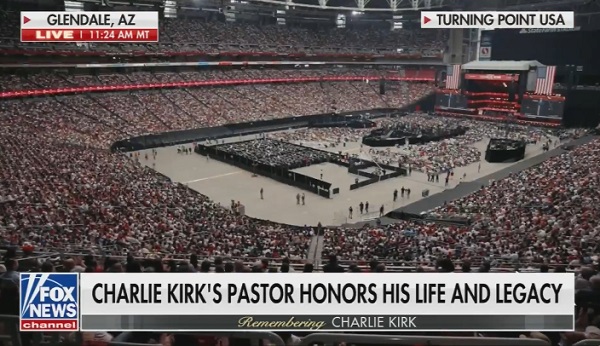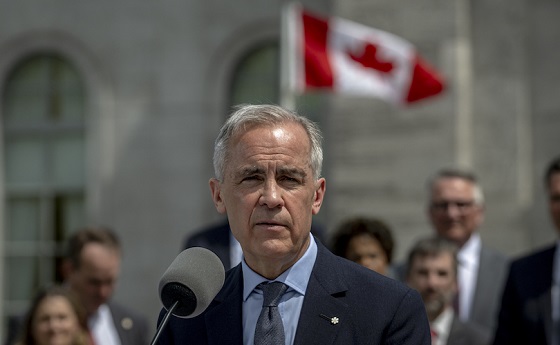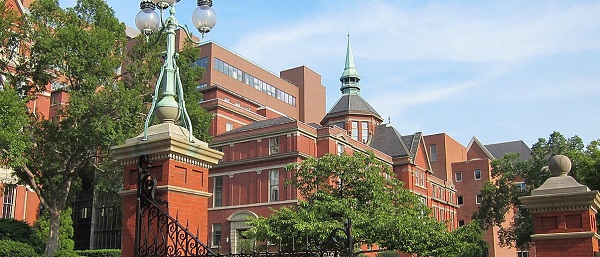Opinion
Approximately 100,000 people join Charlie Kirk’s wife Erika, President Trump, VP JD Vance, RFK Jr., for Charlie’s memorial service

Sunday in Glendale, Arizona, 95,000 people filled State Farm Stadium to honor Charlie Kirk, conservative mega-star and founder of Turning Point USA, who was assassinated on September 10.
The first speaker was Kirk’s pastor, Rob McCoy, who shared a story from just two weeks earlier when he and Charlie traveled to Korea to support persecuted Christians and encourage the youth.
Next came Mike McCoy, Rob McCoy’s son, who began working for Charlie Kirk when he was just 18. It was at Turning Point that he met his wife, standing proudly beside him, and the two married a year later.
Now serving as TPUSA’s Chief of Staff, McCoy delivered a direct and emotional message to Kirk’s assassin that shook the stadium.
“Charlie’s assassin thought that he could steal in silence his voice by putting a bullet in his neck. In the words of Søren Kierkegaard, the tyrant dies and his rule is over. The martyr dies, and his rule has just begun.”
McCoy wasn’t done. He closed with words so powerful they brought the crowd to its feet in a standing ovation.
Dr. Ben Carson then took the stage with an unforgettable four-minute tribute.
“Get on board of the REVIVAL that is coming.”
His words carried the weight of wisdom, but it was the ending Bible verse that really left a lasting impact.
“In closing, I want to read a passage from John 12:24, remembering that Charlie was shot at 12:24 pm. ‘Verily, verily, I say unto you, this is Christ speaking. Except a corn of wheat fall onto the ground and die, it abideth alone. But if it die, it bringeth forth much fruit.’ And I want to thank Charlie for his sacrifice, because much fruit is going to be realized.”
About midway through, TPUSA released footage from moments before the assassination at Utah Valley University. Charlie was smiling and joyful, right up to his last breath.
The livestream hit more than 600,000 live, concurrent viewers on YouTube, a number I’ve never seen before on the platform. The memorial stream was also streamed on several other platforms, drawing huge numbers.
The demand was so overwhelming that the YouTube stream regularly buffered for users, including me on my gigabit internet.
When Tucker Carlson took the stage, his words landed with a weight that could be felt across the stadium. He shared a transformational lesson Charlie had taught him about hate.
The look on Tucker’s face said everything. Not a single word was wasted.
Then came RFK Jr., who became filled with emotion as he recalled an unforgettable conversation with Charlie about death.
The long pause at the 22-second mark in the clip below said it all. You could feel how heavily Kirk’s passing was weighing on him.
JD Vance followed, and his testimony of renewed faith brought the stadium roaring.
“I always felt a little uncomfortable talking about my faith in public. As much as I loved the Lord and as much as it was an important part of my life. I have talked more about Jesus Christ in the past two weeks than I have my entire time in public life.”
Vance then delivered some of the most powerful words ever spoken about Charlie Kirk.
When Erika Kirk stepped forward, she was welcomed with sparklers—the same kind Charlie once orchestrated for RFK Jr. and President Trump during their unity tour.
In her 27-minute speech, Erika spoke from the depths of her soul as she recalled the day her husband died. But a moving moment followed as she revealed she was comforted by a great mercy from God in Charlie’s final moments.
Closing out the service was President Trump, who announced he will soon award Charlie Kirk the Presidential Medal of Freedom posthumously.
What truly resonated with the crowd, though, was his retelling of one of Charlie’s final requests about the city where he grew up.
Charlie Kirk’s life was cut short at 31 years old, but his impact was immeasurable. From the pastor who stood beside him, to the young people he inspired, to the world leaders who honored him on this stage, the message was clear: Charlie changed lives.
The lessons he leaves us with are simple but profoundly vital — live with courage, speak the truth, put faith and family first, and never compromise your soul for an easy path.
In the days since his passing, the response has been overwhelming. Turning Point USA reported more than 54,000 new student inquiries to join or start chapters within just six days of Charlie’s assassination, a figure that surged past 62,000 by the following week.
At the same time, churches across the country are sharing stories of renewed attendance, with pastors noting that people moved by Charlie’s life and testimony are returning to faith in greater numbers.
His influence hasn’t ended; it’s only growing.
Vigilantfox.com is a fully independent news outlet, thanks to readers like you.
If you value what we do, please consider becoming a paid subscriber today.
Your support makes all the difference.
Health
Lack of adequate health care pushing Canadians toward assisted suicide

From LifeSiteNews
The family of an elderly man is speaking out about the terrible hospital conditions that led their father to request euthanasia before he died of natural causes.
The family of Cleo Gratton, an 84-year-old retired diamond driller who died earlier this month in Chelmsford, Ontario, of natural causes after being approved for assisted suicide, is speaking publicly about their appalling experience in the Canadian healthcare system.
According to the CBC, the elderly man “told his family he would rather die than go back to Health Sciences North in Sudbury,” and that a recent stay there found Gratton, who was suffering from heart disease and kidney failure, spending one night in the emergency room and then being transferred to a bed sitting in the hallway on the seventh floor.
“There were no lights, all the bulbs in that hallway had been completely removed,” his daughter, Lynn, told the CBC. “The only light we had was almost like a desk lamp that had been bolted to the wall. Patients are passing by, nurses are going by, no privacy, no compassion, no dignity.” The visit took place in mid-October, after which Gratton decided to apply for “medical aid in dying,” or assisted suicide.
Lynn said that nurses had to use headlamps to inspect her father’s feet, and that the experience was “just one thing after another and it really opened our eyes to what’s going on in our hospitals. My dad said, ‘Push, push, push for change. Make people aware of what’s gong on. Open the discussion, bring it to your MP, your MPP, keep going straight up.”
His family is now honoring his wishes to speak out about his experience. The doctors and nurses, Lynn emphasized, were “amazing,” but she noted that they seem overworked. “Why are they still taking in patients if we have an overcrowding issue and they have no place to put these people?” she said.
Cleo Gratton, who died of natural causes surrounded by his family before he could go through with assisted suicide, is just the most recent of many examples of Canadians opting for assisted suicide because they could not access the care that they actually desired.
In Quebec last year, Norman Meunier, a quadriplegic man, developed bedsores after four days left on an ER stretcher without a good mattress. That experience combined with lack of available homecare pushed him to request, and receive, assisted suicide.
An unnamed woman in her 80s, referred to in a MAID report as “Mrs. B,” received MAID earlier this year after requesting but being denied palliative or hospice care. Instead, with her spouse burning out as the result of her care, a rushed MAID assessment was completed, and she died by lethal injection.
In 2022, 44-year-old Winnipeg woman Sathya Dhara Khovac died by euthanasia after failing to receive the homecare resources she had desperately sought. In her posthumous obituary, she said she could have had more time if she’d had more help.
In 2019, 41-year-old Sean Tagert was euthanized after spending years attempting to find and fund the homecare and resources he needed to stay in the community where his son lived. He did not want to die but felt that he had no other choice.
And, among other stories, at least four Canadian veterans were offered assisted suicide in lieu of the unavailable mental health supports they were requesting.
Stories of Canadians seeking palliative care, mental health resources, homecare, and other medical support finding that the only option available to them is assisted suicide have become routine over the past several years. Euthanasia has become a pressure valve for an overworked and under-funded healthcare system serving an aging population increasingly need of complex care — and if assisted suicide for mental illness is legalize, things will get much, much worse.
Artificial Intelligence
AI Faces Energy Problem With Only One Solution, Oil and Gas


From the Daily Caller News Foundation
Which came first, the chicken or the egg? It’s one of the grand conundrums of history, and it is one that is impacting the rapidly expanding AI datacenter industry related to feeding its voracious electricity needs.
Which comes first, the datacenters or the electricity required to make them go? Without the power, nothing works. It must exist first, or the datacenter won’t go. Without the datacenter, the AI tech doesn’t go, either.
Logic would dictate that datacenter developers who plan to source their power needs with proprietary generation would build it first, before the datacenter is completed. But logic is never simple when billions in capital investment is at risk, along with the need to generate profits as quickly as possible.
Dear Readers:
As a nonprofit, we are dependent on the generosity of our readers.
Please consider making a small donation of any amount here.
Thank you!
Building a power plant is a multi-year project, which itself involves heavy capital investment, and few developers have years to wait. The competition with China to win the race to become the global standard setters in the AI realm is happening now, not in 2027, when a new natural gas plant might be ready to go, or in 2035, the soonest you can reasonably hope to have a new nuclear plant in operation.
Some developers still virtue signal about wind and solar, but the industry’s 99.999% uptime requirement renders them impractical for this role. Besides, with the IRA subsidies on their way out, the economics no longer work.
So, if the datacenter is the chicken in this analogy and the electricity is the egg, real-world considerations dictate that, in most cases, the chicken must come first. That currently leaves many datacenter developers little choice but to force their big demand loads onto the local grid, often straining available capacity and causing utility rates to rise for all customers in the process.
This reality created a ready-made political issue that was exploited by Democrats in the recent Virginia and New Jersey elections, as they laid all the blame on their party’s favorite bogeyman, President Donald Trump. Never mind that this dynamic began long before Jan. 20, when Joe Biden’s autopen was still in charge: This isn’t about the pesky details, but about politics.
In New Jersey, Democrat winner Mikie Sherrill exploited the demonization tactic, telling voters she plans to declare a state of emergency on utility costs and freeze consumers’ utility rates upon being sworn into office. What happens after that wasn’t specified, but it made a good siren song to voters struggling to pay their utility bills each month while still making ends meet.
In her Virginia campaign, Democrat gubernatorial winner Abigail Spanberger attracted votes with a promise to force datacenter developers to “pay their own way and their fair share” of the rising costs of electricity in her state. How she would make that happen is anyone’s guess and really didn’t matter: It was the tactic that counted, and big tech makes for almost as good a bogeyman as Trump or oil companies.
For the Big Tech developers, this is one of the reputational prices they must pay for putting the chicken before the egg. On the positive side, though, this reality is creating big opportunity in other states like Texas. There, big oil companies Chevron and ExxonMobil are both in talks with hyperscalers to help meet their electricity needs.
Chevron has plans to build a massive power generation facility that would exploit its own Permian Basin natural gas production to provide as much as 2.5 gigawatts of power to regional datacenters. CEO Mike Wirth says his team expects to make a final investment decision early next year with a target to have the first plant up and running by the end of 2027.
ExxonMobil CEO Darren Woods recently detailed his company’s plans to leverage its expertise in the realm of carbon capture and storage to help developers lower their emissions profiles when sourcing their needs via natural gas generation.
“We secured locations. We’ve got the existing infrastructure, certainly have the know-how in terms of the technology of capturing, transporting and storing [carbon dioxide],” Woods told investors.
It’s an opportunity-rich environment in which companies must strive to find ways to put the eggs before the chickens before ambitious politicians insert themselves into the process. As the recent elections showed, the time remaining to get that done is growing short.
David Blackmon is an energy writer and consultant based in Texas. He spent 40 years in the oil and gas business, where he specialized in public policy and communications.
-

 Addictions2 days ago
Addictions2 days agoCanadian gov’t not stopping drug injection sites from being set up near schools, daycares
-

 Business2 days ago
Business2 days agoParliamentary Budget Officer begs Carney to cut back on spending
-

 Education2 days ago
Education2 days agoWhy classroom size isn’t the issue teacher unions think it is
-

 Business2 days ago
Business2 days agoCarney government needs stronger ‘fiscal anchors’ and greater accountability
-

 Alberta2 days ago
Alberta2 days agoChatGPT may explain why gap between report card grades and standardized test scores is getting bigger
-

 Alberta1 day ago
Alberta1 day agoFederal budget: It’s not easy being green
-

 Fraser Institute2 days ago
Fraser Institute2 days agoCourts and governments caused B.C.’s property crisis—they’re not about to fix it
-

 Education2 days ago
Education2 days agoJohns Hopkins University Announces Free Tuition For Most Students





















